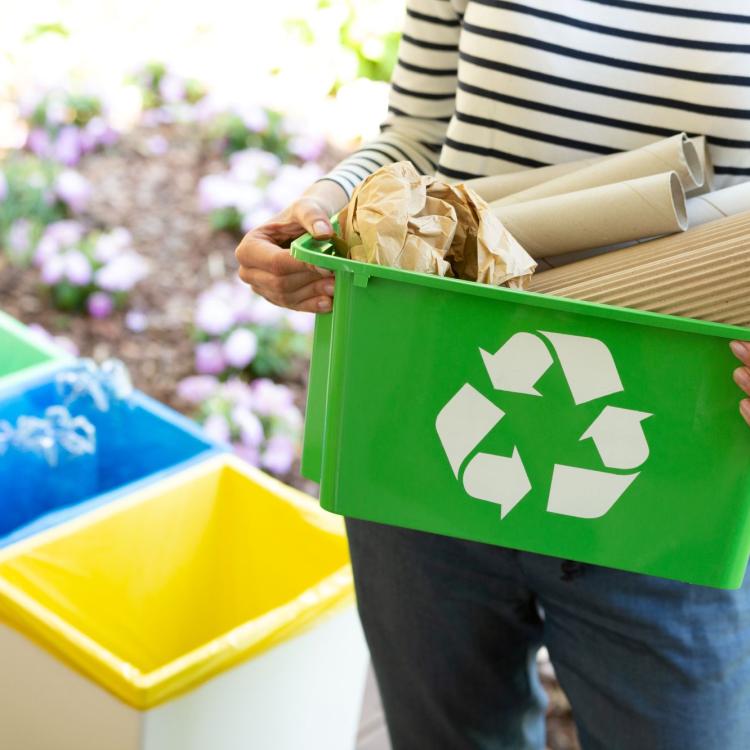Sustainability isn't limited to campus life. Whether you are a student, faculty or staff, the following resources can help save money, support the community, and reduce pollution—all while supporting your home.
Off-Campus Resources
Cleaning products, soap, and cosmetics can utilize harmful chemicals and adding unnecessary plastics to the waste stream. Find safer and more sustainable products via EWG’s Guide to Healthy Cleaning and EPA’s Safer Choice.
Some other best practices to reduce packaging & single use items:
- Buy refillable products or ones that come in glass or aluminum
- Buy your favorite personal care items in bulk
- Use bar soap and shampoos
- Use reusable kitchen towels (instead of single-use paper towels)
- Switch to natural sponges that can be composted
The University of Pittsburgh is committed to reducing greenhouse gas emissions from commuter travel 50% by 2030. You can help Pitt achieve this goal by choosing shared and/or active transportation options when traveling to campus.
Fare-Free Public Transportation
- All Pitt students and employees ride Pittsburgh Regional Transit fare free with the Ready2Ride app. Just sync up your Pitt information to ride buses & inclines at no cost.
- Pittsburgh Regional Transit provides transit service throughout Allegheny County, including Oakland and and the City of Pittsburgh.
- Many bus lines that run through Pitt’s campus to other neighborhoods. Routes commonly used by Pitt riders include the 54, 58, 61A, 61B, 61C, 61D, 67, 69, 71A, 71B, 71C, 71D, 75, 81, 83, 93, & P3.
- Use Transit App to track buses, check PRT’s online schedules, and/or get a printed schedule at Pitt’s Parking & Transportation office.
Pitt Shuttle
In addition to Pittsburgh Regional Transit, students may also use Pitt Shuttle routes connecting through Oakland and other neighborhoods.
Biking
From bike rentals to rack locators, the University of Pittsburgh is committed to making bike riding a convenient and accessible transportation choice:
- Basic campus biking info
- Pitt Bike Cave – Visit to learn how to and fix your bike (with our tools) or join a ride!
- Bike Share – Pitt students and employees have access to unlimited free 30 minute rides via POGOH bike share.
Walking
Walking is a carbon-free mode of commuting — and uses the least amount of street space. Walking can save time and money, while helping you get exercise in as part of getting to and moving around campus. Learn more about walking around campus here.
Parking On or Near Campus
If you do need to drive to campus:
- A limited number of student parking permits parking passes are available for purchase
- Visitor & daily parking is available in University lots with variable rates.
- Metered street parking in the City of Pittsburgh is payable by cash, credit, or app .
- If a commuter student,
- Consider parking at a PRT Park & Ride and taking the bus to campus.
- Contact Pitt Mobility for commuter support!
Energy
Sources: Duquesne Light and Peoples Natural Gas are the utilities that deliver your electricity and natural gas, respectively, in the City of Pittsburgh. However, across Pennsylvania, residents can choose where they buy their energy from, even when renting.
Specific to electricity, this means you can choose to purchase renewable electricity. PA Power Switch can help you determine which energy provider is right for you — and how to make the switch happen. ENERGY STAR appliances will help save energy, helping reduce your utility use.
Energy Saving Tips:
- Enable energy saving modes on your electronics, especially your computer.
- Washing your clothes in cold water can reduce laundry energy usage by up to 90%.
- When you aren’t home, keep your blinds or curtains open in winter and closed in summer.
- Unplug appliances when not in use.
Water
- On Campus: Pitt strictly monitors and tests water quality to ensure safety across campus buildings.
- Off Campus: Most student homes in Pittsburgh get water from the Pittsburgh Water & Sewer Authority (PWSA), which consistently meets state and federal standards. PWSA is nationally recognized for improving drinking water and is replacing all lead service lines citywide by 2026. Wondering if your residence has lead pipes? Use PWSA’s interactive map and request a free lead test kit. If lead levels are high, they’ll provide a free water filter.
Water Saving Tips:
- Turn off the faucet while brushing your teeth
- Keep showers to 5 minutes or less
- Run only full loads of laundry
- Meal planning and cooking from home can save money and prevent food waste. Courses on nutrition and cooking for all ages are offered by the SHRS Wellness Pavilion.
- Community Supported Agriculture (CSA) connects consumers directly to local farmers. These programs cut down on pollution caused by shipping and food waste, while providing quality food that often is less expensive than grocery store prices.
- SNAP benefits can be used at local farmers markets through the Fresh Access program.
- Services such as Imperfect Foods and Flashfood sell food items safe for consumption but are likely to be disposed of by larger grocery stores due to blemishes or nearing its expiration date.
Laundry is one of the most resource-intensive chores at home. Try these tips to make it lighter on energy, water, and chemicals:
- Only do full loads of laundry
- If you do wash smaller loads, choose the appropriate size setting.
- Replace plastic jugs of detergent with greener alternatives (detergent power, sheets, concentrate, pods, etc.)
- Use cold water to wash whenever you can (reducing energy use and helping your clothing last longer by preserving fabric integrity)
- Use reusable wool balls instead of dryer sheets
Refillable retailers allow shoppers to bring their own containers to fill with personal care and home products, or utilize store provided reusable containers that are returned by customers.
- East End Food Co-op (Homewood)
- The Refillery (Oakmont)
- Sol Refill (delivery within Pittsburgh area)
The University’s official Off-Campus Living page should be your primary location for finding information about securing safe and sustainable housing.
To supplement that official source, the information below was adapted from a Fall 2022 student project by Tara Stevenson and Elena Ziskind.
Housing Market
If you are looking to live in Oakland, please keep in mind:
- Landlords sometimes start listing units in September or October for the following year.
- Make sure you understand the length of any lease you are signing.
- Rentals near campus are often more expensive, but can reduce your travel time.
Pitt students live in a number of other Pittsburgh neighborhoods close to to campus, including Greenfield, Shadyside, and Squirrel Hill. These neighborhoods are further from campus than North, Central, or South Oakland, but you can ride public transportation fare free, check out Pitt shuttle services to these areas, and/or set up your POGOH bike share account, which gives Pitt students and employees unlimited 30-minute bike share rides.
Housing Considerations
Budgeting: When creating a budget for living off-campus, take into account rent, utilities, and other necessities. Pitt’s Financial Wellness team can help you create a budget that prepares you for off-campus living.
Utilities: Make sure you know what utility costs are included in your rent (if any) — and which are not. Different landlords and rental property management companies cover utility costs differently (or not at all). Make sure you consider ALL utilities (electricity, gas, water, sewage, internet, etc.). If you live in an apartment building, some landlords may even have garbage / recycling fees!
Energy Bills: If your electricity and/or gas bills are not included in your rent, ask what a typical energy bill looks like for a current tenant in both summer and winter; this will help you budget appropriately — and give you an idea of how energy efficient the property is.
Water Bills: If your water & sewage bill is not included in your rent, ask for a typical water & sewage combined charge is for a fully occupied apartment.; this will help you budget appropriately — and give you an idea of how water efficient the property is.
Other Costs: Beyond rent and utilities, you may want to consider the following when deciding where to rent your first (or next) apartment:
- Is any portion of the property pre-furnished?
- What maintenance is provided?
- Does the apartment have energy efficient lighting, appliances, HVAC, and/or windows? (These will help lower your energy bill).
- Does the apartment have water efficient faucets, showerheads, dishwasher, washing machine, etc.
- Are there laundry facilities on site? Do you have to pay to access them?
- Is there bike parking/storage available?
- If you or a roommate has a car, is there private, off-street parking available – and what does it cost? Is there street parking and/or do you need a street parking permit for yourself and/or visitors?
Renter’s Rights
Fair Housing Laws protect tenants from being discriminated against based on factors such as race, ethnicity or religion. Landlord Tenant Laws ensure proper procedures be followed regarding the process of repair, maintenance, and eviction.
In the City of Pittsburgh, landlords are required by law to offer recycling to tenants. Visit this link for city information on curbside recycling for single-family home and multifamily buildings (5 or fewer units)
Landlord Responsibilities
While tenants have responsibilities of caring for a rental property, landlords also have responsibilities to tenants. For example:
- Right of Quiet Enjoyment – A landlord cannot unreasonably interfere with your right to possess the leased premises.
- Implied Warrant of Habitability – Ensures tenants have a right to a decent place to live — and landlord must uphold standards of livability.
- All bedrooms must have a window to be legally considered a bedroom.


